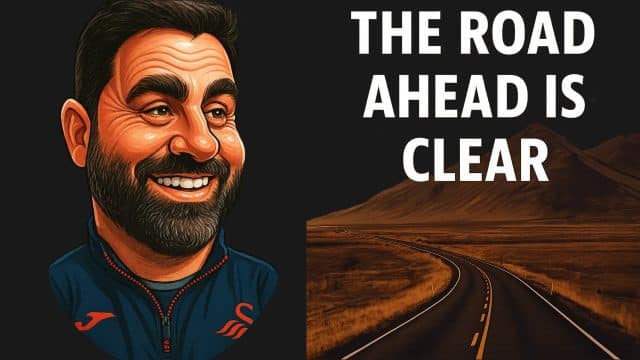Vítor Matos’ first game in charge of Swansea City ended in defeat, and not just any defeat. A 2-1 reverse at home to Derby County carried with it the weight of a fourth consecutive loss, the kind of run that gnaws at confidence and exposes the cracks in a side still searching for its rhythm. Matos, speaking afterwards, was clear in his assessment: Swansea must be more aggressive, sharper in the final third, and braver in their counter-press. His words were measured, but the undertone was unmistakable. This team is too passive, too hesitant, and too easily undone.
The match itself told the story. Derby’s Joe Ward struck with a close-range header before half-time, punishing Swansea for failing to turn possession into penetration. Lars-Jørgen Salvesen doubled the visitors’ lead early in the second half, and though Ethan Galbraith’s stoppage-time strike offered a flicker of consolation, it was too little, too late. The Swans had the ball, but Derby had the bite. That imbalance defined the evening swanseacity.com.
From the stands, the frustration was palpable. Swansea’s play had moments of promise, especially in the opening half-hour, but the lack of conviction in the final third was glaring. Passes were neat, movement was tidy, yet the edge was missing. It felt like watching a side rehearsing patterns rather than imposing themselves on an opponent. Derby, by contrast, were direct, disciplined, and ruthless when chances came. The gulf in aggression was stark, and it is here that Matos’ words cut to the heart of the matter.
“We need to be much more effective in the last third,” Matos said. “We need to start being a team that counter-presses and is much more aggressive in these moments because that will allow us to attack again and have the team more balanced” swanseacity.com. It is a philosophy rooted in energy and intent, but it is also a demand for courage. Swansea have long prided themselves on possession football, but possession without purpose is sterile. Matos knows this, and his challenge is to inject urgency into a side that too often drifts.
Our own report captured the mood: a shambles show, a performance that lacked conviction and left supporters wondering where the spark had gone. That description is not hyperbole. For all the talk of transition and limited preparation time, the basics of aggression and desire cannot be excused. Swansea were second best in too many duels, too slow to react when the ball broke loose, and too cautious when opportunities beckoned. The late goal from Galbraith was well taken, but it masked little. The game had already slipped away.
Context matters here. Matos has inherited a side low on confidence, bruised by recent results, and still adjusting to his methods. He had only a handful of sessions with the players before Derby, and expecting instant transformation would be unfair. Yet football is unforgiving, and supporters judge by what they see. What they saw was a team that looked fragile, lacking the aggression their new head coach insists is essential. The challenge now is to turn words into actions, and quickly.
There is also the question of identity. Swansea’s tradition of possession-based football is cherished, but it must evolve. The Championship is a league that punishes hesitation and rewards intensity. Derby showed that in abundance, pressing with conviction and attacking with clarity. Swansea, by contrast, seemed caught between ideals: wanting to control the ball but reluctant to take risks. Matos’ call for counter-pressing is not a rejection of possession, but a demand that it be purposeful. To win the ball back high, to attack with energy, to make possession a weapon rather than a comfort blanket.
Supporters know the difference. They have seen Swansea sides that marry style with steel, sides that can pass teams into submission but also fight for every ball. That balance has been missing, and until it returns, results will continue to suffer. Matos’ honesty is welcome, but honesty alone will not change the table. Training ground work, tactical clarity, and above all, a shift in mentality are required.
The Derby defeat should serve as a wake-up call. Not because the scoreline was catastrophic, but because the manner of the performance was symptomatic of deeper issues. Too passive, too predictable, too easily beaten. Matos has identified the problem, and supporters will hope he can instill the aggression he demands. The fixtures ahead will test that resolve, and the patience of a fanbase that has endured too many false dawns.
 For those who have followed Swansea for decades, the frustration is not just about one game. It is about the erosion of identity, the drift from a side that once played with swagger and conviction to one that now looks tentative and uncertain. Matos’ arrival offers a chance to reset, but only if his words translate into deeds. Aggression is not just about tackles and pressing; it is about mentality, about believing you can impose yourself on the opposition. Swansea must rediscover that belief.
For those who have followed Swansea for decades, the frustration is not just about one game. It is about the erosion of identity, the drift from a side that once played with swagger and conviction to one that now looks tentative and uncertain. Matos’ arrival offers a chance to reset, but only if his words translate into deeds. Aggression is not just about tackles and pressing; it is about mentality, about believing you can impose yourself on the opposition. Swansea must rediscover that belief.
In the end, the Derby defeat was not just another loss. It was a mirror held up to Swansea’s current state: possession without penetration, effort without edge, and a team in need of a spark. Matos has diagnosed the illness. The cure will take time, but time is a luxury the Championship rarely affords. The next few weeks will reveal whether Swansea can find the aggression their head coach demands, or whether this season will continue to drift into disappointment.

This article first appeared on JACKARMY.net.


2 replies
Loading new replies...
First Team Player
North Banker
Join the full discussion at the Welcome to the Lord Bony Stand →